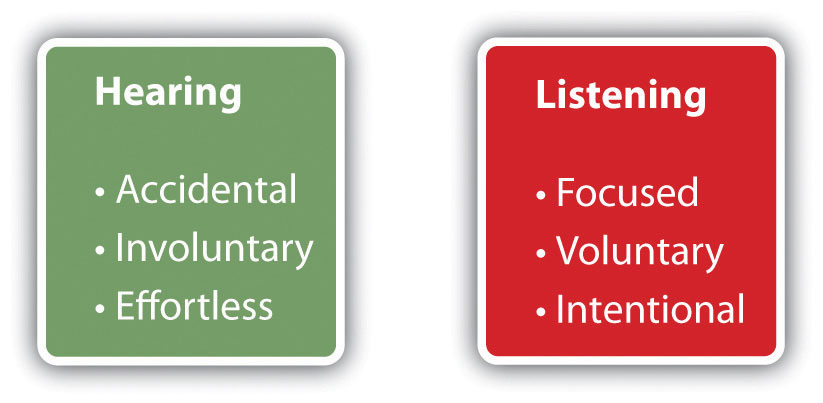Which Choice Best Describes Attentive Listening
To listen closely and reply well is the highest perfection we are able to attain in the art of conversation Attentive and active listening means absorbing and being able to accurately recall what the other person has said to reach a mutual understanding. Informational Listening Listening to Learn Critical Listening Listening to Evaluate and Analyse Therapeutic or Empathetic Listening Listening to Understand Feeling and Emotion In reality you may have more than one goal for listening at any given time for.

The Different Types Of Listening And Asking Effective Questions Studyperth
Teamwork Multiple Choice Questions-.

. Kevin is not a good listener because he interrupts the speaker to make a point. Listen attentively take accurate notes and avoid prejudging the speaker. Respond to the following in three to five sentences.
Kevin is a good listener because he uses attentive body language and takes notes. It involves genuine concern and interest for understanding a persons. Have your participants pair up.
As the discussion develops you note. Which statement below best describes mindful listening. Which of the following is a verbal cue you can use to show youre actively listening.
Bailey is a good listener because she asks questions to better understand the speaker. There are a few general listening styles that people use depending on the situation they are in and whether they are operating on a more emotional or logical level. When a friend shares something unpleasant with you empathetic listening is probably the best way to go.
The following attentive listening skills will help you uncover the true messages your counterparts are conveying. Describe the steps to active listening. Method researchers use to answer questions about cause and effect B.
Bailey is not a good listener because she makes frequent interruptions. In conversation I generally just listen and absorb what others are conveying. Match the term below with its correct definition.
Try to be interested while asking questions to clarify your. None of the above. First you should stop what you were doing previously and give the speaker your full attention which will show them that you care about their words and will acknowledge what they have to say.
The satisfaction and functional level of elderly patients in the unit are assessed in this study by questioning them about nursing care behavior. There are two major types of listening skills. Attentive data driven listening the person is listening to the content but fails to receive all the non-verbal communications such as tone of voice facial expression and the speakers body language.
It allows you to take responsibility for your feelings. Beware of order - the answers will not necessarily be in. The three guidelines for ethical listening discussed in your textbook are a.
Bailey is a good listener because she uses attentive body language and takes notes. Which terms do social scientists use to describe these ways of processing information. Self Identity and Personality.
All team members really seem concerned with helping each other and working as a team. Knowing that the person with the most information is usually the one in control of a negotiation should give you an incentive to be a. Researchers select a group of participants end then observe them over a period of time C.
Misunderstood listening unconsciously overlaying their own interpretations and making things fit when they actually dont. Caring behaviors include things like sensitivity comforting attentive listening honesty and nonjudgmental acceptance all of which are concerned with a patients well-being. Support free speech avoid name-calling and listen attentively.
Listen attentively avoid prejudging the. Empathetic Listening Bad news is just a part of life. Mirroring Automatic reflectionmirroring of any facial expressions used by the speaker can be a sign of attentive listening.
Be motivated to listen. 29 How would you best describe your ability to work and communicate in a stressful environment. The attentive listener tends to lean slightly forward or sideways whilst sitting.
Completing cognitive tasks and accomplishing relational tasks. You are likely to hear ALL the given answers so choosing the one you hear the first is not a good strategy. Answer to this question is required.
Understanding the different styles of listening can improve your. Listening critically and offering others advice. Other signs of active listening may include a slight slant of the head or resting the head on one hand.
The factors in Coopers two-factor model of effective listening are. Be attentive - sometimes the speaker can correct himself or give new details. Which of the following kinds of communication do students spend most time engaged in.
Which best describes what kind of listener Kevin is. Kevin is a good listener because he asks questions to better understand the speaker. If youre actively listening you might ________.
It involves emotionally connecting. Trying to understand how someone is feeling when he or she speaks listening while taking notes and documenting the speakers ideas and encouraging the speaker to fully express his or her feelings. If youre facing the person speaking youre always actively listening.
All of the above. When we move beyond hearing and start to listen researchers note that we process information in two very different ways. Chapter 8 comm 121.
As Francois de La Rochefoucauld wrote. The team leader has just made an impassioned plea to improve the level of cooperation that exists within the group. One person is instructed to vent to the other about a.
Zoe is giving a presentation on the Midwest region of the US. 12 Select one choice that best describes your approach when working in a security environment. Active listening is described in all these statements.
Heres how to do it. Which best describes what kind of listener Bailey is. Here are 21 active listening exercises that provide you with different ways to develop effective listening skills.
Learning critical listening skills is an important part of building interpersonal relationships and processing important information. The three main types of listening most common in interpersonal communication are.

Improving Your Listening Skills Linkedin Learning Exam Answers Mygurug Tutorials

Listening Matters Top Down And Bottom Up Listening Article Onestopenglish

Comments
Post a Comment